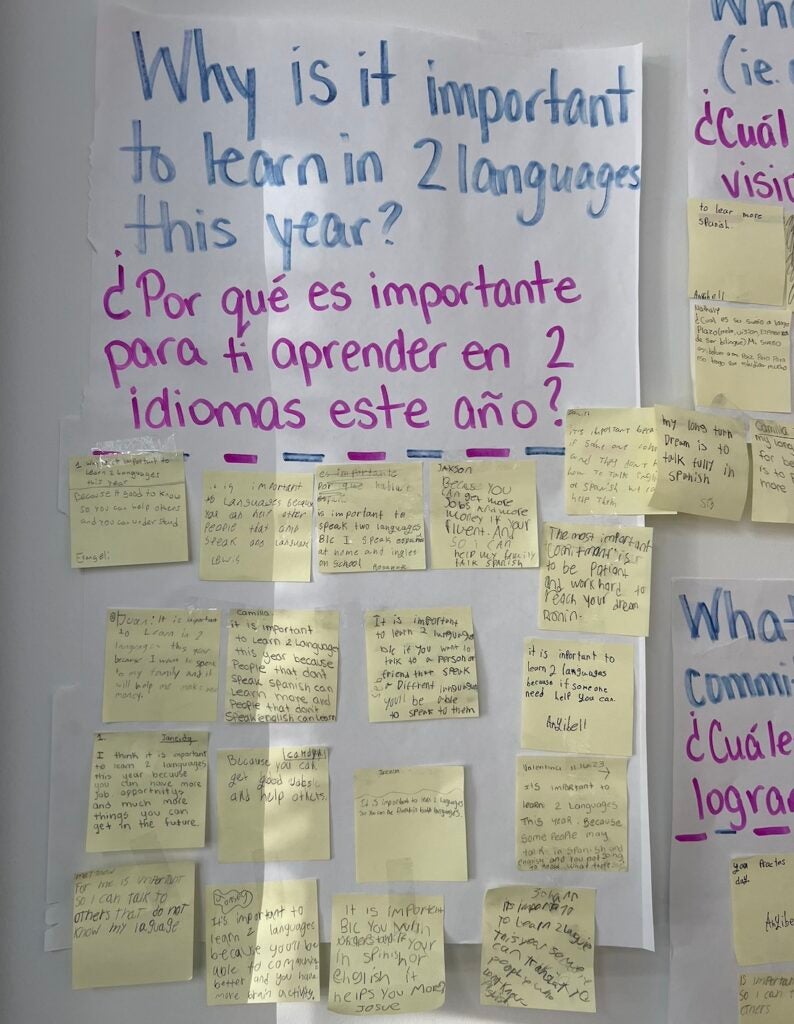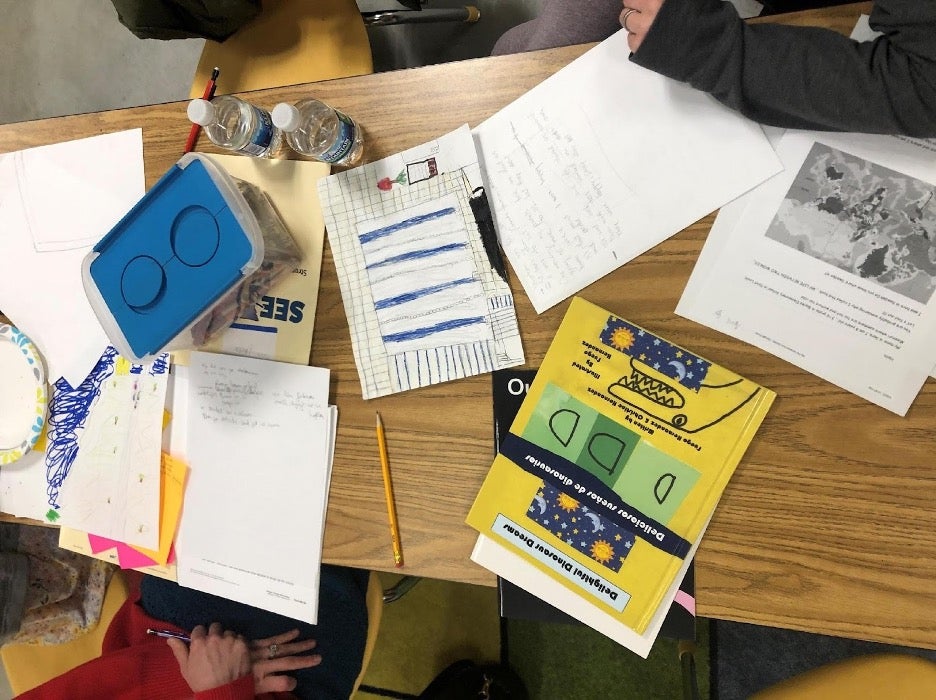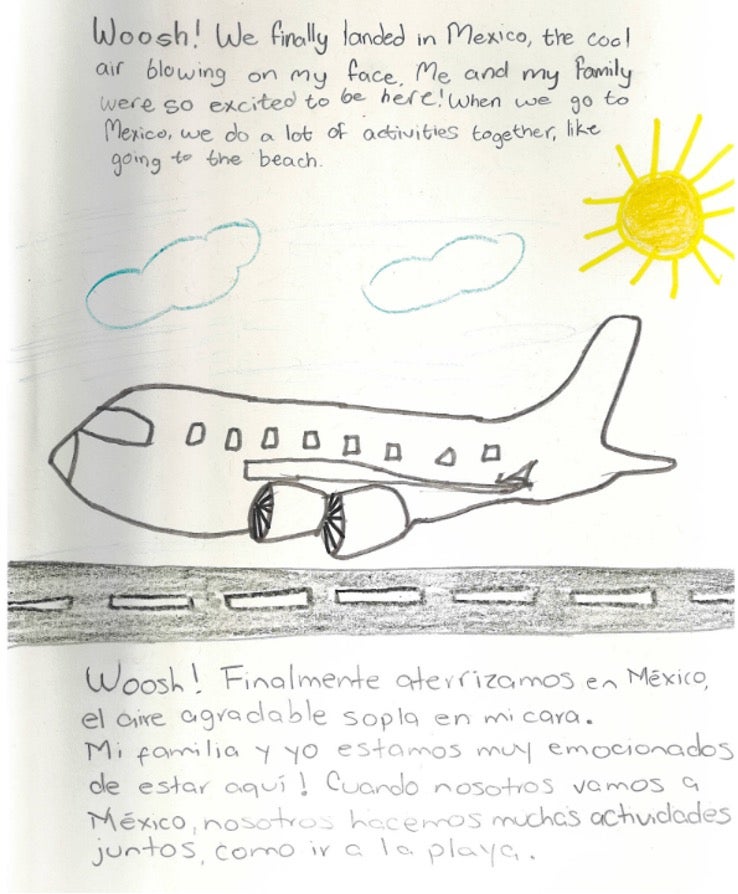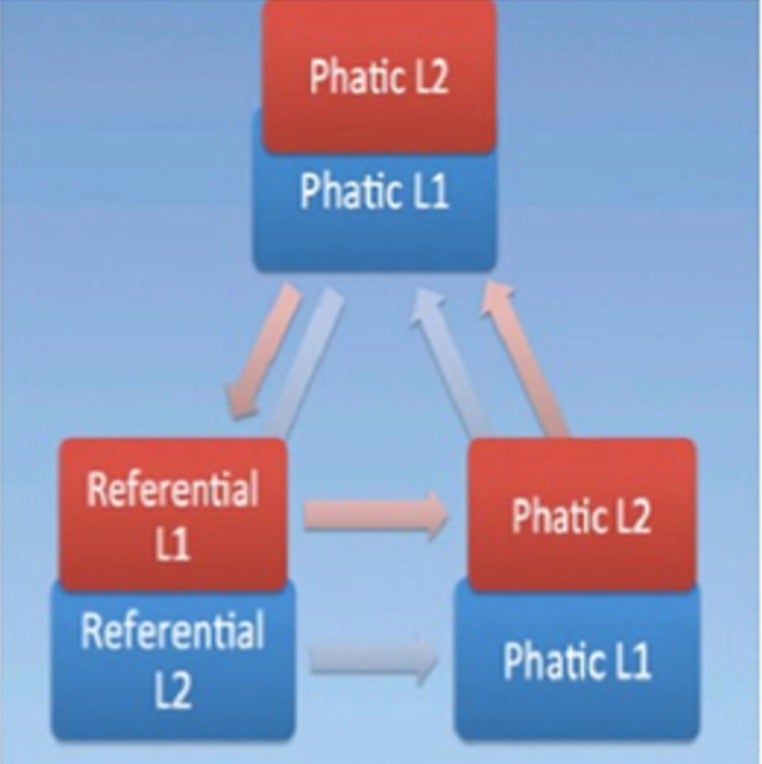Recently Completed Translanguaging Studies from Lab Faculty
Translanguaging Pedagogy in Bilingual Programs (2023-2024)
In this study, funded by the Rhode Island Department of Education, Dr. Laura Hamman-Ortiz collaborated with Dr. Sarah Hesson (Rhode Island College) to explore how teachers working at schools with bilingual programs in Rhode Island engaged with professional learning around translanguaging. Over the course of the 2023-2024 school year, Dr. Hamman-Ortiz and Dr. Hesson facilitated monthly professional learning workshops with nineteen educators at two bilingual schools. While the structure of each workshop session varied, each included professional learning around translanguaging, time for application and/or instructional planning, and reflection on learning. Teachers also maintained Translanguaging in Action journals across the year, in which they shared artifacts of translanguaging pedagogies that they were experimenting with in their classrooms and reflected upon how learning about translanguaging was impacting their practice.
Findings revealed that, by and large, translanguaging pedagogy had a positive impact on both teachers and their students, opening up more opportunities for student participation and engagement and helping teachers to see bilingual learning as a dynamic, flexible process. The researchers also identified a range of possibilities and constraints that teachers faced in exercising their agency around translanguaging pedagogy, including at the micro-level (e.g., teachers’ own linguistic abilities), meso-level (e.g., opportunities to collaborate), and macro-level (e.g., curriculum policies/mandates). This study points to the importance of exploring the mediating influences and contextual factors that shape teachers’ agency in embracing translanguaging pedagogy and to the possibilities for translanguaging to serve as an affirming and powerful pedagogical practice in bilingual learning contexts.



Publications from this study:
- Hamman-Ortiz, L. & Hesson, S. (forthcoming). An ecological perspective on translanguaging pedagogy in bilingual programs: Challenges and possibilities. In H. Uysal & A. Gao (Eds.), Language teacher agency: Trans-perspective approaches and actionable strategies. Springer.
- Hamman-Ortiz, L. & Hesson, S. (under review). “Translanguaging significa libertad”: Cultivating language teacher agency in dual language bilingual education.
Multilingual Family Stories (2021-2022)
In this multilingual family engagement project and study, Dr. Nicole King partnered with Dr. Kim Song (University of Missouri-St. Louis), and Dr. Greg Child (Michigan State University), as part of the SEE-TEL (Strengthening Equity and Effectiveness for Teachers of English Learners), to explore how multilingual families across four Missouri school districts partnered with teachers to construct and share multilingual stories. The story project was intentionally designed with community translanguaging workshops in which we positioned multilingual families as language architects (Flores, 2020) and used the following framing tenets: 1) multilingual families are language architects who can transcend language policies and practices; 2) multilingual families’ funds of knowledge can embolden translanguaging literacy development; and 3) multilingual families’ story making process can leverage equity for educators of emergent bilingual learners (EBLs).
In order to frame multilingual families as expert storytellers, we began monthly planning meetings with teachers and district coaches in the fall of 2021 and transitioned the meetings to focus on enactment and reflection in spring of 2022. Throughout the multilingual family story making workshops, we collected multi-tiered data from planning meetings to the final story books and audio recordings. A total of seventy-eight (78) people – 47 family members including children, 24 teachers, 4 coaches, and 3 researchers – took part in this project. A total of 19 family stories were constructed.
We identified three emerging themes in the multilingual, multimodal composing process: 1) families manifesting translanguaging knowledge and repertoires, 2) Teachers and researchers developing authentic, caring relationships with parents and children, and 3) families enacting leadership in developing their biliteracy through their own stories/histories. Families frequently displayed transmodal composition and storytelling practices, as they flexibly translanguaged and trans-semiotized materials to tell their stories through their ways of knowing. Some teachers critically interrogated the cariño (Bartolomé, 2008) mindset and how it required framing MLFs as partners and critiquing existing literacy and leadership policies.
The study calls for a critical analysis of educational spaces in new ways that frame multilingual families as partners and leaders in their children’s educational experiences and in the telling of their family stories.


Publications from this study:
- King, N., & Song, K. H. (2024, April). Co-constructing translanguaging spaces for equity and justice through multilingual family storytelling. Paper presented at American Education Research Association (AERA) 2024. Philadelphia, PA.
- Song, K., & King, N. (2023). Collaborative multilingual families’ story making that transcends school policies and practices of inequity at community translanguaging spaces. In V. J. Lee, & K. S. L. Grant (Eds.) (2023). Advancing culturally responsive and socially just approaches to multilingual family – school partnerships (pp. 3-28). Lexington Books. https://rowman.com/ISBN/9781666910971/Advancing-Culturally-Responsive-and-Socially-Just-Approaches-to-Multilingual-Family-School-Partnerships
Leveraging Glocal Linguistic Landscapes for Critical Language Awareness (2020-2025)
In this multi-year, multi-institutional, cross-cultural study, Dr. Przymus collaborated with Dr. Osman Solmaz (Dicle University, Diyarbakir, Turkiye), Dr. Antonieta Cal y Mayor Turnbull & Dr. Ana María Candelaria Domínguez Aguilar (Universidad Autónoma de Chiapas, Tuxtal Gutiérrez, México), and with Dr. Migdalial Elizabeth Rodríguez Rosales (Universidad de Sonora, Hermosillo, México) to connect Turkish EFL teaching candidate students and Mexican EFL teaching candidates with students from secondary English Language Arts teaching candidates from Texas Christian University (TCU) in the analysis of glocal linguistic landscapes to use in shared lesson plan creation.
Twenty-one preservice teacher candidates from the US state of Texas and 20 candidates from southeastern Türkiye collaborated during the Fall 2020 semester; 20 candidates from southern México and 8 candidates from the same Texas university collaborated during Fall 2021; and 21 teacher candidates from northern México and 9 candidates from Texas partnered during Fall 2022 to co-create LLinL2TL lesson plans. Results demonstrate that although the LLinL2TL pedagogical model facilitated collaborative lesson plan creation between international partners, students quickly became aware of the power relations in their languaging practices. All US students became aware that the communicative burden fell upon Turkish and Mexican students, making the American students feel incompetent. Pedagogical translanguaging, coupled with the focus on glocal linguistic landscapes, facilitated learner agency in meaning-making and helped address these issues of Critical Language Awareness.
See image below for an example of how students in México analyzed shop signs in English and Spanish and how they leveraged these signs to facilitate critical language awareness discussions with students.

Although all three telecollaboration projects were successful in meeting the objective that students worked cross-culturally to create shared lesson plans, ultimately, only the telecollaboration project between Turkiye & the U.S. that included purposeful professor intervention and training on the pedagogical translanguaging model “Functional Approach to Communicating Electronically” (FACE) (see image below) was successful in creating positive bilingual relationships between cross-cultural participants.

Easy de Traducir: Geomapping Spanish Language Billboards Across Fort Worth, Texas (2023-2024)
How languages are used in public spaces, our linguistic landscape (LL), influences how individuals feel about those languages and, by default, the speakers of those languages. In this study the authors conducted a year-long multimodal ethnography of the use of Spanish on billboards in the 11th largest U.S. city, Fort Worth, Texas. Using the geomapping app Lingscape, the authors discovered a surprising and potentially influential pattern of primarily using the Spanish language on Fort Worth billboards to advertise for alcohol companies. They argue this sends a clear (albeit unconscious), unspoken message of the place, value, and role of Spanish in Fort Worth. Examples of translanguaging were also present on the signs (see Images below). Learning about how languages are used and presented in society can raise critical language awareness among youth in communities and work towards empowering those youth to reorient the discourse about their languages and identities.


